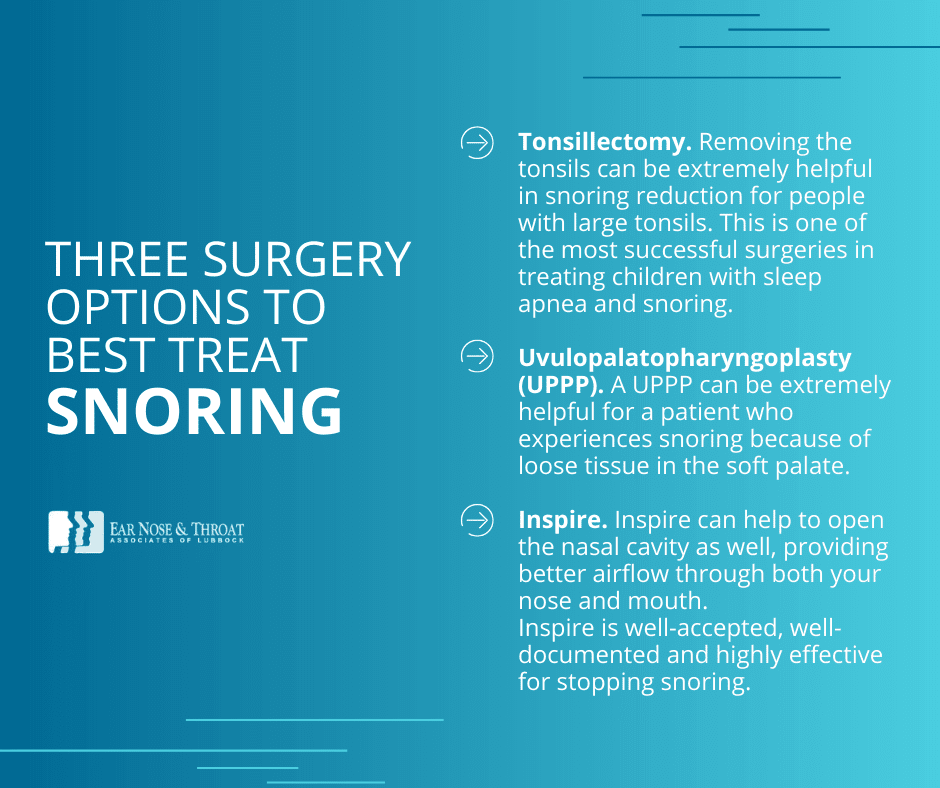6 Snoring Surgery Options That Could End Your Snoring

Have you ever woken yourself up with your own snoring? That can be a jarring experience! But that’s not even the most common reason patients come to our office for help with their snoring.
The top reason is actually complaints from their partner!
No one wants to go through a medical procedure. But if you (or your partner) are concerned about your snoring, it’s good to know that surgery could help.
What Should I Try Before Considering Snoring Surgery?
Anytime we have a patient complaining of snoring, we want to address the root cause, not just ease the symptom.
To start, we take a look inside your nose to identify any obvious obstructions. If you’re dealing with nasal or sinus congestion, we’ll try to address those with medications, such as decongestants. These can be over-the-counter or prescription, depending on how severe your congestion is.
If we see any other obstructions, like nasal polyps or an anatomical abnormality, we’ll discuss with you how we can correct these.
We’ll also inspect your throat to see if there’s anything that could be contributing to obstructing airflow while you sleep. For example, enlarged tonsils are a common cause of snoring, especially in children.
We might also discuss weight loss if it seems like your weight could be contributing to snoring. Fatty tissue in the neck can put pressure on the airway, leading to a noisier snooze. Losing a few pounds can sometimes have a dramatic effect on snoring!

What Are the Types of Surgery for Snoring?
There are several surgeries that can help with snoring. Some specifically treat snoring, and some treat another condition and result in relief from snoring as a pleasant side effect.
Let’s look at some of these surgeries: three that we perform today, and three that we think are better left behind.
Glossectomy
Believe it or not, years ago it was common to cut away a portion of the back of the tongue to prevent snoring. Fortunately, we don’t do this anymore. It was about as painful as it sounds!
Pillar Implant
With a pillar implant procedure, the surgeon inserts several small pillars into your soft palate (the back of the roof of your mouth). These pillars are meant to keep your soft palate from collapsing and causing airway obstruction.
Unfortunately, this is a temporary solution, and it’s not always effective. That’s why we don’t prefer to perform this surgery, or the following procedure, in our practice.
Somnoplasty
Somnoplasty is a procedure that uses radiofrequency waves to shrink the tissues in the nose and mouth. The results are also temporary and, again, not always effective.
This would likely be a last resort for someone who has tried a number of other solutions without success.
While these two procedures could theoretically offer temporary relief from snoring to a small percentage of patients, they aren’t something we offer at ENT Lubbock.
Tonsillectomy
Removing the tonsils can be extremely helpful in snoring reduction for people with large tonsils. This is one of the most successful surgeries in treating children with sleep apnea and snoring. For children, the recovery is generally pretty easy.
The recovery time for an adult tonsillectomy can be more difficult. Plan to take two or three weeks to recover if you and your ENT doctor choose the tonsillectomy route for your snoring surgery.
Uvulopalatopharyngoplasty (UPPP)
This surgery first removes the tonsils if they haven’t already been removed. Several small incisions are then made in the soft palate. When the surgeon sutures these incisions, they tighten the palate, making it less likely to interfere with airflow.
A UPPP can be extremely helpful for a patient who experiences snoring because of loose tissue in the soft palate.
Despite how it looks, the most difficult part of this procedure isn’t the pronunciation. The recovery can be painful, and an overnight hospital stay for pain management is generally required.
Inspire
Inspire is a small device that’s similar to a pacemaker. It includes a sensor that sits in your chest, detecting when you’re trying to take a breath. When it does, a probe sends a gentle electrical signal to the nerve that controls your tongue. Your tongue then moves out of your airway to allow you to breathe without restriction.
Inspire is well-accepted, well-documented and highly effective for stopping snoring. This little pacemaker-type device can lead to a 90% reduction in snoring, and a 100% reduction in your partner leaving the bedroom!
Inspire is an outpatient procedure and requires about a week to recover. As with any surgery or implanted device, there is also a small risk of infection.
What’s the Outlook After a Snoring Surgery?
The prognosis after these surgeries is excellent, assuming that there’s a good match between the right patient and the right procedure.
It’s important to address the root cause of your snoring, so be sure to talk to your ENT doctor about whether any of these snoring surgeries could be the right fit for you.
If your bed partner has been elbowing you at night and encouraging you to get help for your snoring, go ahead and reach out! At ENT Associates of Lubbock, we’re experts in getting you the help you need to stop snoring.
Dr. Cuthbertson is a physician at Ear Nose & Throat Associates of Lubbock. He joined the team at ENT Lubbock from Houston, where he was chief resident of the prestigious Bobby R. Alford Department of Otolaryngology at Baylor College of Medicine. He is board certified in Otolaryngology and Head & Neck Surgery and has quickly built a reputation, not only as an extremely skilled surgeon, but as an approachable and compassionate clinician adept in the newest standards and technologies. Learn more about Dr. Cuthbertson.
Categories:








